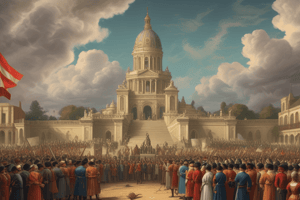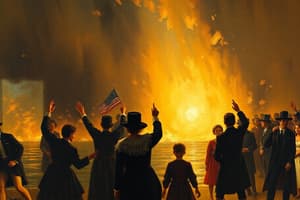Podcast
Questions and Answers
What was the primary source of resentment among the Third Estate leading up to the French Revolution?
What was the primary source of resentment among the Third Estate leading up to the French Revolution?
- The burden of taxation (correct)
- Inefficient monarchy policies
- Exemption from taxes for nobility
- The influence of Enlightenment ideas
Which Enlightenment idea significantly influenced the revolutionary change in France?
Which Enlightenment idea significantly influenced the revolutionary change in France?
- Absolute monarchy
- Liberty and equality (correct)
- Feudalism
- Divine right of kings
What economic issue directly contributed to social unrest in France before the revolution?
What economic issue directly contributed to social unrest in France before the revolution?
- Financial strain from war debts (correct)
- Government subsidies for the clergy
- High taxation on the nobility
- Increase in agricultural production
What was one of Louis XVI's failures in attempting to manage the financial crisis?
What was one of Louis XVI's failures in attempting to manage the financial crisis?
How did the social structure of the Ancien Régime contribute to the French Revolution?
How did the social structure of the Ancien Régime contribute to the French Revolution?
What event highlighted the weaknesses of the monarchy in 1789?
What event highlighted the weaknesses of the monarchy in 1789?
Which factor did NOT contribute to the financial crisis leading to the French Revolution?
Which factor did NOT contribute to the financial crisis leading to the French Revolution?
What role did social unrest from the Third Estate play in the lead-up to the French Revolution?
What role did social unrest from the Third Estate play in the lead-up to the French Revolution?
What event symbolized the start of the French Revolution?
What event symbolized the start of the French Revolution?
What was the outcome of the Tennis Court Oath?
What was the outcome of the Tennis Court Oath?
Which of the following statements about the August Decrees is correct?
Which of the following statements about the August Decrees is correct?
What was the main failure of the Declaration of the Rights of Man and of the Citizen?
What was the main failure of the Declaration of the Rights of Man and of the Citizen?
What was the primary effect of the Civil Constitution of the Clergy?
What was the primary effect of the Civil Constitution of the Clergy?
Which statement best describes the outcome of Napoleon's invasion of Russia in 1812?
Which statement best describes the outcome of Napoleon's invasion of Russia in 1812?
What was a key feature of the Napoleonic Code established in 1804?
What was a key feature of the Napoleonic Code established in 1804?
What was a result of the Flight to Varennes in 1791?
What was a result of the Flight to Varennes in 1791?
What did the Continental System aim to achieve?
What did the Continental System aim to achieve?
What was one significant failure of the Constitutional Monarchy established in 1791?
What was one significant failure of the Constitutional Monarchy established in 1791?
Flashcards
Ancien Régime
Ancien Régime
The French society before the Revolution, characterized by three estates: clergy (privileged, exempt from taxes), nobility (landowners, exempt from many taxes), and commoners (bourgeoisie, peasants, urban workers) who paid most of the taxes.
Economic Inequality
Economic Inequality
The inequality created by the Ancien Régime where the Third Estate bore the majority of the tax burden while the First and Second Estates were exempt.
Enlightenment Ideas
Enlightenment Ideas
Enlightenment thinkers like Voltaire, Rousseau, and Montesquieu challenged traditional power structures, advocating for liberty, equality, and democracy.
Inefficient Monarchy
Inefficient Monarchy
Signup and view all the flashcards
Financial Crisis
Financial Crisis
Signup and view all the flashcards
Failure of Reform
Failure of Reform
Signup and view all the flashcards
Social Unrest
Social Unrest
Signup and view all the flashcards
Estates-General
Estates-General
Signup and view all the flashcards
Storming of the Bastille
Storming of the Bastille
Signup and view all the flashcards
Meeting of the Estates-General
Meeting of the Estates-General
Signup and view all the flashcards
Tennis Court Oath
Tennis Court Oath
Signup and view all the flashcards
The Great Fear
The Great Fear
Signup and view all the flashcards
Declaration of the Rights of Man and of the Citizen
Declaration of the Rights of Man and of the Citizen
Signup and view all the flashcards
Military Successes of Napoleon
Military Successes of Napoleon
Signup and view all the flashcards
Coup of 18 Brumaire
Coup of 18 Brumaire
Signup and view all the flashcards
Napoleonic Code
Napoleonic Code
Signup and view all the flashcards
Concordat of 1801
Concordat of 1801
Signup and view all the flashcards
Study Notes
Long-Term Causes of the French Revolution
- Ancien Régime: France's social structure, divided into three estates (Clergy, Nobility, Commoners), deeply unequal and unfair with the Third Estate bearing the brunt of taxation. This created resentment and social unrest.
- Economic Inequality: The burden of taxation fell disproportionately on the Third Estate, while the privileged First and Second Estates were exempt. This created widespread poverty and unrest, weakening the financial health of the nation.
- Enlightenment Ideas: Philosophers like Voltaire, Rousseau, and Montesquieu promoted liberty, equality, and democracy, challenging traditional authority and inspiring revolutionary change, but also led to divisions within society.
- Inefficient Monarchy: Louis XVI's inability to reform the tax system and costly wars exacerbated financial crises and eroded public trust.
Short-Term Causes of the French Revolution
- Financial Crisis: War debts from the American Revolution and disastrous harvests led to widespread food shortages, high bread prices, and hunger, pushing the nation towards a crisis.
- Failure of Reform: Louis XVI's attempts at reform through the Assembly of Notables and the Estates-General, instead of resolving the crisis, further exposed the weakness of the monarchy and heightened revolutionary tensions.
- Social Unrest: Growing resentment within the Third Estate over unequal taxation, poverty, and privilege fueled revolutionary sentiment, leading to widespread unrest and peasant revolts.
- Immediate Spark: The Storming of the Bastille on July 14, 1789, became a powerful symbol of defiance against royal oppression and sparked widespread violence.
Events of the French Revolution (1789)
- Meeting of the Estates-General (May 1789): Louis XVI called the Estates-General to resolve the financial crisis, but the Third Estate declared itself the National Assembly, sparking a revolutionary change in political power
- Tennis Court Oath (June 1789): The National Assembly vowed not to disband until a constitution had been established, demonstrating revolutionary determination.
- Storming of the Bastille (July 14, 1789): This pivotal moment marked the start of revolutionary violence as a symbol of defiance against royal oppression.
- The Great Fear (July-August 1789): Peasant uprisings against feudal dues and landlords led to the abolition of feudal privileges.
- August Decrees (August 1789): Abolished feudal privileges, ending centuries of inequality.
- Declaration of the Rights of Man and of the Citizen (August 26, 1789): Established fundamental rights like equality before the law and freedom of speech, but excluded women and other marginalized groups.
Events of the French Revolution (1790-1791)
- Civil Constitution of the Clergy (1790): Brought the Church under state control, creating divisions within France by alienating devout Catholics.
- Flight to Varennes (1791): Louis XVI's attempted escape heightened distrust in the monarchy and the revolutionary movement became radicalized.
- Constitution of 1791: Created a constitutional monarchy with a Legislative Assembly, moving France towards more democratic governance.
Napoleon Bonaparte
- Rise to Power: Napoleon's military successes, including the Siege of Toulon and Italian Campaign, established him as a military genius. His coup of 18 Brumaire (1799) overthrew the Directory and consolidated power as First Consul.
- Consolidation of Power: The Napoleonic Code established legal equality but curtailed some women's rights. The Concordat of 1801 reconciled the Catholic Church with the state. Napoleon's centralized administration improved governance, but placed power in his hands.
- Napoleonic Wars: The Continental System aimed to weaken Britain but damaged the European economy. The disastrous Russian campaign (1812) weakened Napoleon's military, marking a turning point in his imperial ambitions.
Studying That Suits You
Use AI to generate personalized quizzes and flashcards to suit your learning preferences.




